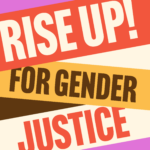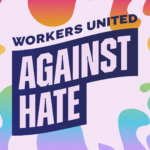December 6, 2014: National Day of Remembrance and Action on Violence Against Women
It has been twenty five years since 14 women were murdered at Montreal’s École Polytechnique. And yet, women and girls in Canada still face violence in their homes, schools, workplaces, and communities every single day. Sexist images and attitudes are rampant in our media and online. Women who speak out are targeted and harassed.
We cannot let this continue.
Canada’s labour movement wants to help create a society where future generations of girls will not have to deal with violence, discrimination or inequality simply because of their gender. We want a world where girls and women can work and pursue their education and training without fear. That’s what fairness means.
The labour movement has taken an active role in ending violence against women. We have worked hard to make work safer for women by addressing sexual harassment and violence in the workplace.
We helped win Canada’s gun control provisions in the wake of December 6, 1989, and we continue to stand up for effective gun control measures. Today, we are supporting calls for a National Inquiry on Missing and Murdered Indigenous Women and working with our allies to push the federal government to develop a National Action Plan on Violence against Women.
To mark the 25th anniversary of the École Polytechnique murders, Canada’s labour movement is stepping up its efforts to address violence against women in the workplace. With our partners at Western University, the Canadian Labour Congress is releasing the results of a groundbreaking national survey on the Impact of Domestic Violence in the workplace.
The survey shows that a substantial number of workers in Canada have experienced domestic violence―one third of the 8429 people who participated, with women, Aboriginal people and, lesbian, gay, bisexual and trans people reporting higher rates of violence.
We also learned that the violence does not stay at home. It follows people to work, it has a significant impact on work performance, and for almost ten percent, it has cost them their job.
It’s time to talk. This survey is the start of a conversation; one that needs to involve unions, employers and governments, about how we can make sure that people who experience domestic violence can feel safe on the job, and feel supported by their union and employer. The survey makes this challenge clear, and we’re ready to take it on.
Read about the survey and watch our video.
This December 6, we remember 14 women, and so many others. And, we commit to action.
Geneviève Bergeron―Hélène Colgan―Nathalie Croteau―Barbara Daigneault
Anne-Marie Edward―Maud Haviernick―Maryse Laganière―Maryse Leclair
Anne-Marie Lemay―Sonia Pelletier―Michèle Richard―Annie St-Arneault
Annie Turcotte―Barbara Klucznik-Widajewicz




